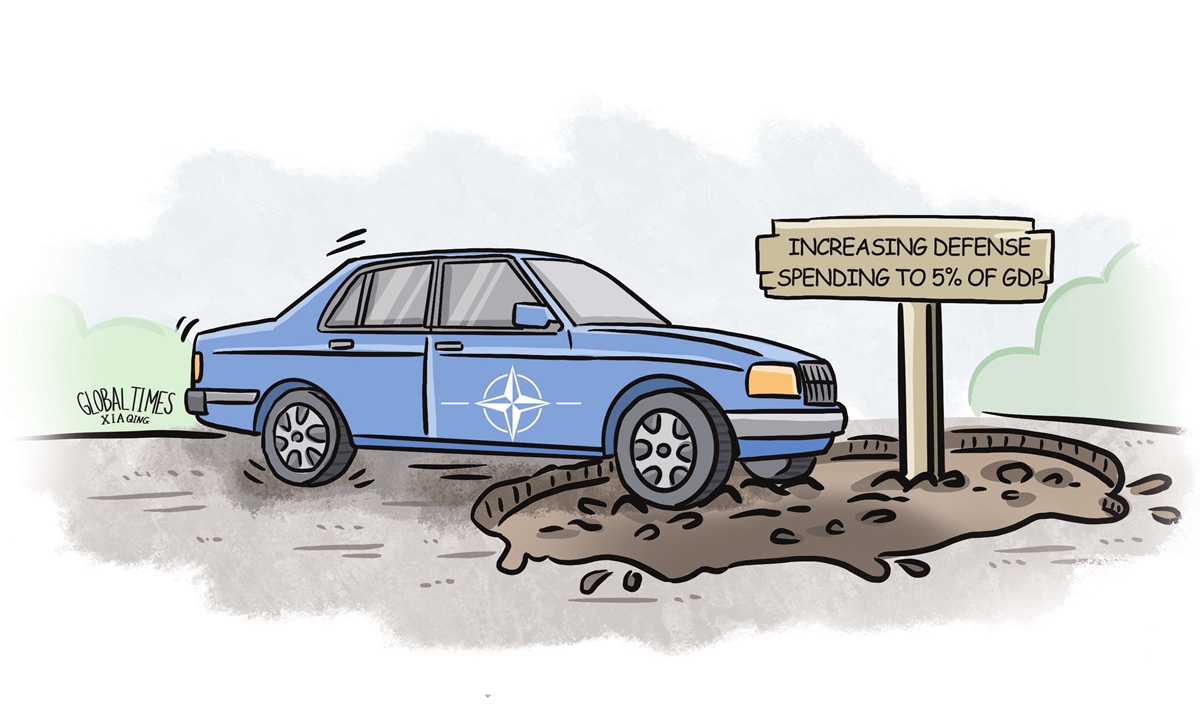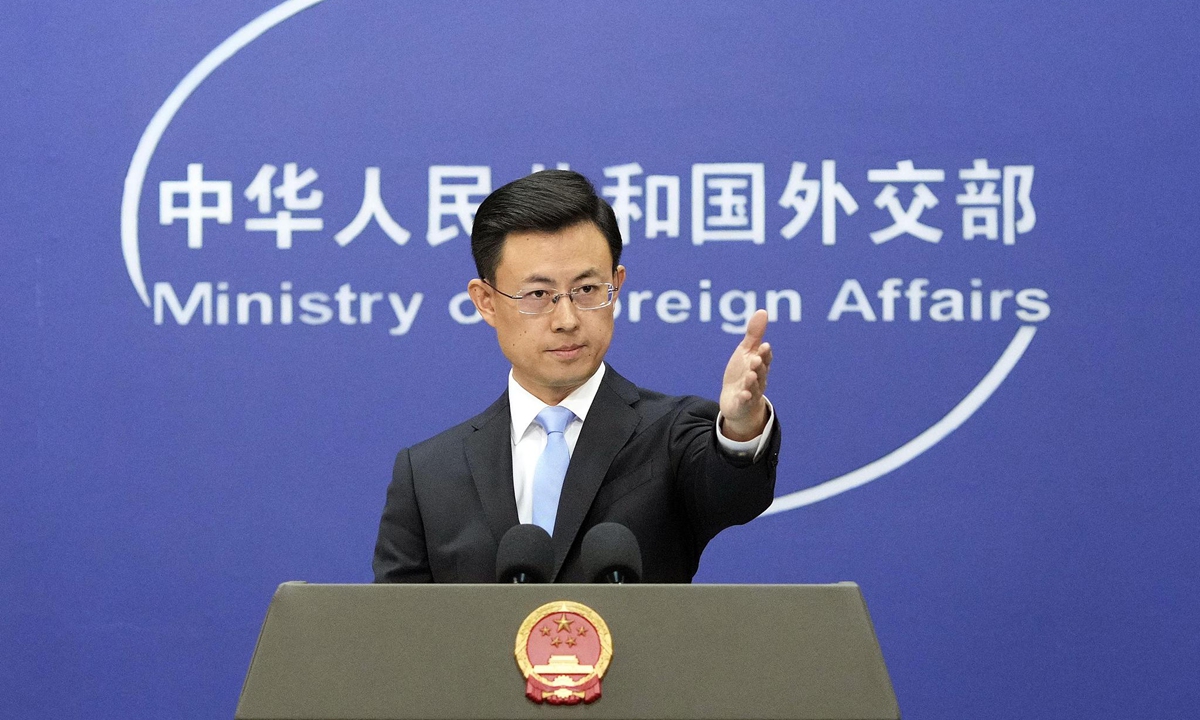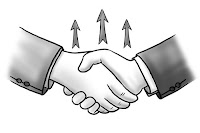
Illustration: Xia Qing/GT
The 2025 NATO Summit was held from Tuesday to Wednesday in The Hague, the Netherlands. In the joint statement after the meeting, the most important "outcome" was an agreement to raise defense spending to 5 percent of GDP - a goal that prompted a "strong backlash" in Europe when it was proposed by the US earlier this year. NATO Secretary-General Mark Rutte, acting as Washington's "loyal canvasser," pulled out all the stops to "trick" European countries into loosening their purse strings: When the "Russia threat" was no longer enough, he trotted out the "China threat," making irresponsible comments about the Taiwan question and even smearing China using the Ukraine issue. This not only digs a pit for European countries but also causes trouble and chaos for the world.Raising defense spending from 2 percent to 5 percent of GDP within a decade - more than doubling it - will amount to trillions of dollars in additional expenditure, making NATO one of the fastest-growing entities in global military spending. The last time NATO called for a military spending increase was in 2014, with most of the largest increases coming from Eastern European countries. Ten years on, have these nations become more secure because of this? The answer is obvious. Not only was Eastern Europe implicated in the war, but the whole of Europe was forced into the Ukrainian crisis, and the global economy has suffered as a result. NATO's unchecked and unrestrained military expansion is largely to blame.
Hyping claims that China's naval fleet is already the "same" size as the US and that China will "possess 1,000 nuclear warheads by 2030" is essentially an attempt to legitimize NATO's infiltration into the Asia-Pacific. By using the "China threat" to justify its military expansion, NATO even beat the US to the punch in pledging to "prepare for a possible conflict in the Taiwan Straits." If NATO insists on extending its war tentacles to Asia, it is almost certain that the more it increases its military spending, the greater the strategic suffering Europe will have to bear.
This logic of "engaging in military expansion while accusing others of being a threat" is not only foolish but also malicious. When Rutte emphasized that NATO "has no opt-out," it was nothing but intimidation for member countries that leaving the alliance midway is simply not an option. His claim of "securing our future," meanwhile, is precisely an attempt to completely tie Europe onto the US' war chariot. NATO, a war machine that should have been shut down long ago, now relies on clinging to US coattails and doing Washington's "dirty work" to survive, constantly spinning the absurd narrative that "war equals security" to scare Europeans. NATO has become Europe's net liability. A classic example is that if NATO had not expanded eastward, there would be no Russian-Ukrainian conflict.
Among NATO's painstakingly groomed four "Indo-Pacific partners" (IP4), three leaders skipped this summit - partly due to concerns that, amid the current Middle Eastern turmoil, the summit "could become a trap." These countries neither want to get involved in Middle Eastern conflicts nor be forced to pledge to increase defense spending. US magazine The Diplomat said that Australia's post-9/11 alignment with the American missions in Iraq and Afghanistan drew the country into protracted conflicts. These conflicts, initiated by NATO led by the US, proved politically unpopular and financially draining. It is clear from this that the idea of "seeking peace through force" is actually unpopular in the international community.
The US' erratic behavior in recent years has led many European nations to believe they should do more to strengthen their own defense and reduce dependence on the US. But a dramatic increase in NATO military spending clearly runs counter to that goal. Before the summit, Rutte told US President Donald Trump that "Europe is going to pay in a big way, as they should, and it will be your win." When this comment came to light, it caused a media storm. Yet, this flattery and boasting was met with Trump's contempt and doubt about NATO's collective defense clause. Despite this, Rutte continued to reassure Europeans that they should "stop worrying" but focus on "this huge irritant, which is that we are not spending enough." NATO has long been overwhelmingly driven by US will, but this act of self-gaslighting reveals just how dire Europe's "strategic non-autonomy" has become.
The era of NATO is long gone. Under the guiding principle of "America First," Washington repeatedly wields a "no money, no protection" stance, reducing NATO to a bargaining chip in US geopolitical trades. Allocating 5 percent of GDP to military spending is a heavy burden for European countries, but it still falls far short of satisfying Washington's geopolitical appetite and will only make the US ask for more from Europe. European nations, especially those unwilling to be dragged into wars, must remain clearheaded. - Global Times editorial: https://www.globaltimes.cn/page/202506/1336995.shtml

Chinese Foreign Ministry spokesperson Guo Jiakun
Some in NATO, by playing up international and regional tensions and slandering China's normal military buildup, seek nothing but excuses to allow NATO to drastically grow its military spending, arbitrarily reach beyond its geographical scope and mandate, and advance eastward into the Asia-Pacific, Chinese Foreign Ministry spokesperson Guo Jiakun said on Thursday.
We firmly oppose NATO using China as an excuse to "expand eastward into the Asia-Pacific" and urge NATO to reflect on its own behaviors, change course, and contribute more to global security and stability, Zhang Xiaogang, a spokesperson for China's Ministry of National Defense, also stated on the same day.
These remarks were made in response to NATO chief Mark Rutte's claim on Wednesday that it's really important that NATO spends more, given factors including Russia-Ukraine conflict and so-called China's massive military buildup.
Guo noted that NATO countries already account for 55 percent of the world's total military spending in 2024. Yet they're still required to raise defense investment to 5 percent of GDP to build a "more lethal NATO." What exactly is NATO's objective behind this? NATO calls itself a regional organization, but it keeps reaching beyond the geographic scope defined in its treaty and into the Asia-Pacific by claiming that what happens there and in Euro-Atlantic are "interconnected". The world is not blind to NATO's calculations, and countries in the Asia-Pacific are certainly wary of it, said Guo.
Guo stated that on Ukraine, China has all along been promoting talks for peace and actively pushing for a political settlement of the crisis. China has never provided weapons to any party to the conflict and exercised strict export control over dual-use articles. China's objective and impartial position and constructive role have been widely recognized by the international community, while NATO's disinformation cannot deceive people around the world. If NATO truly cares about the security of Europe and the world, it should stop adding fuel to the fire and instigating confrontation.
China acts as a builder of world peace, a contributor to global development, a defender for international order and a supplier of public good. On peace and security, China has the best track record among major countries. We call on NATO to examine its own behavior, listen to the just voice of the world and let go of its outdated Cold War mentality, bloc confrontation and zero-sum approach. Time for NATO to get its perception right about China and stop manipulating issues on China, Guo said.
China will firmly uphold sovereignty, security, and development interests, and continue to do its part to make the world a more peaceful and stable place, Guo added.
When asked to comment on the NATO Secretary General's recent claims that NATO should strengthen its partnership with Indo-Pacific countries, citing so-called military challenges posed by China, Zhang stressed that China adheres to the path of peaceful development, and is committed to a national defense policy that is defensive in nature. China's military development is purely aimed at safeguarding national sovereignty, security and development interests.
The claim that China is "providing Russia with key support during the Russia-Ukraine conflict" is complete nonsense, said Lü Xiang, a research fellow at the Chinese Academy of Social Sciences. "The root cause of the Russia-Ukraine conflict lies in the US long-term meddling in regional affairs. Europe, while being a participant in the conflict, is also a victim—yet under US pressure, it has been forced to go along with the situation."
The NATO Secretary General essentially serves as Washington's spokesperson in Europe, said Lü. As a product of the Cold War and the world's largest military alliance, NATO is gradually becoming a "zombie" organization in the post-Cold War era.
"In an attempt to justify its continued existence, it keeps exaggerating and fabricating so-called security threats, thereby aligning itself with US strategic objectives and pressuring member states to increase military spending," Lü - By Shen Sheng added. https://www.globaltimes.cn/page/202506/1337040.shtml











